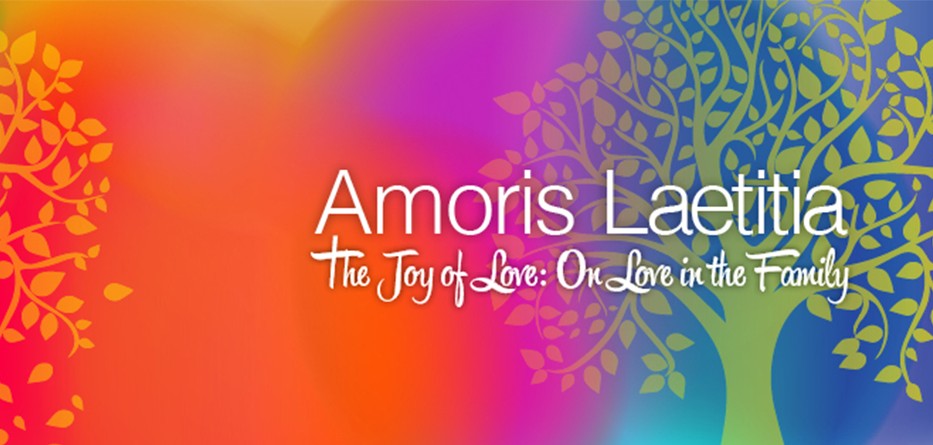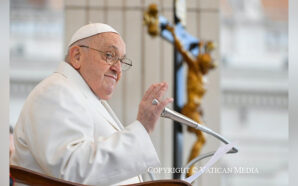To clearly reaffirm not “the ideal” of the family, but its rich and complex reality, in order to reflect on love in the family together with the women and men of our time. With this purpose in mind, on 19 March 2016, the Solemnity of St Joseph, Pope Francis signed the Post-synodal Apostolic Exhortation Amoris Laetitia, The Joy of Love: On Love in the Family.
The highly anticipated document, speaks the language of experience, offering an open and profoundly positive outlook, which feeds not on abstractions or ideal projections, but on pastoral attention to reality. The text, laden with spiritual points and practical wisdom suitable to every couple and to those people who hope to build a family, was the fruit of practical collaboration with people who have experienced many years of family life.
The vast Exhortation is divided into nine chapters and more than 300 paragraphs which include the results of the two synods on the family convened by Pope Francis in 2014 and 2105. The concluding reports of the two conferences are largely cited, along with documents and teachings of his predecessors, and the Pontiff’s own catecheses on the family.
Australia’s Archbishop Mark Coleridge and Bishop Eugene Hurley attended the Synod on the Family in Rome in October last year. Speaking on behalf of the Australian Catholic Bishops Conference, Archbishop Coleridge said that in Amoris Laetitia Pope Francis speaks as a true pastor who really knows the human heart and is well aware of the pressures now facing marriage and the family.

The Holy Father is well aware of the pressures now facing marriage and the family. Photo: Drop of Light/Shutterstock.com
“The Pope moves between the ideal and the real, offering the Church’s vision of marriage and the family but also dealing with the facts on the ground, which can be messy,” Archbishop Coleridge said.
In the document, the Holy Father sees marriage and the family in dynamic terms, writing of them as a journey. “The Synod process,” he notes, “allowed for an examination of the situation of families in today’s world”, opening up “a broader vision” and a renewed awareness of the importance of marriage and the family, which is counter cultural in today’s society.
Francis does not shy away from complex and controversial issues including divorce, abortion, domestic violence, euthanasia, ‘same-sex marriage’ and gender ideology. He stresses the need to care for the most vulnerable in society, especially the elderly, people with disability and migrants.
In reference to the sexual abuse of children, Francis said, “the sexual abuse of children is all the more scandalous when it occurs in places where they ought to be made safe” (45).
On unions between homosexual persons, the Pope writes, “We would like before all else to reaffirm that every person, regardless of sexual orientation, ought to be respected in his or her dignity and treated with consideration” (250).
“Only the exclusive and indissoluble union between a man and a woman has a plenary role to play in society as a stable commitment that bears fruit in new life” (52).
Archbishop Coleridge said the Pope’s words were both high-visioned and home-spun, at times soaring but often down-to-earth. “They summon the Church to accompany people on their journey, listen to them and help them discern the truth of their situation, and discover where God is in the mess,” he said.
Dr Maria Harries, Chair of Catholic Social Services Australia, said the Holy Father identified the appalling impacts on families of a huge variety of evils such as war, violence, addictions, poverty, unemployment, homelessness, gross materialism and greed that lead to isolation, despair, loneliness, fragmentation of families and peoples everywhere.
“He invites us to not lose hope but to walk with and embrace families who suffer, married couples who are in trouble and those who feel alienated,” Dr Harries said.
Shawn and Branka van der Linden, a married couple with four young children, who represent the Australian Catholic Marriage and Family Council, said to have a Church document that speaks in a realistic way about the practicalities of family life was a great encouragement and relevant to their lived experience.
On the Australian Catholic Bishops Conference (ACBC) website you can download the text of Amoris Laetitia and read the summary document and Q&A provided by the Vatican. Click here
To watch a brief summary of the document by Archbishop Coleridge click here








